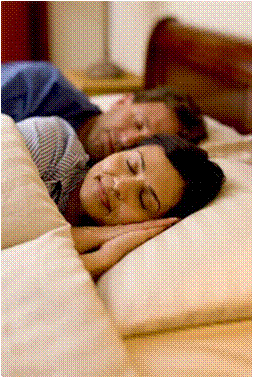|
TT Sleep |
|
Sleep Smart |



|
Snoring . Is it serious ? Two types |
|
There is snoring that is an indicator of obstructive sleep apnea and there is also primary snoring.
Primary Snoring, also known as simple snoring, snoring without sleep apnea, noisy breathing during sleep, benign snoring, rhythmical snoring and continous snoring is characterized by loud upper airway breathing sounds in sleep without episodes of apnea (cessation of breath). Primary snoring is not serious and does not affect your health.
How Does we differentiate Primary Snoring Differ from the more serious Snoring that Indicates Obstructive Sleep Apnea?
Think of snoring as serious if
· Snoring is heroically loud · Snorer pauses snoring followed by gasps for breath · Daytime Sleepiness · Hypertensive · Most importantly, Sleep Study is normal · · SEE DIAGNOSE SLEEP APNEA
What can be done about primary snoring?
First It is absolutely necessary to rule out obstructive sleep apnea or other sleep disorders.
Be wary of any one who says it is not necessary.
To reduce or relieve Primary Snoring : · Behavioral and lifestyle changes · Devices · Medicines · Surgery
|
1. Primary Snoring2. Snoring that indicates Obstructive Sleep Apnea |
A polysomnogram (sleep study) that is normal ie shows:
· Snoring and other sounds often occurring for long episodes during the sleep period
· No associated abrupt arousals, arterial oxygen desaturation (lowered amount of oxygen in the blood) or cardiac disturbances
· Normal sleep patterns · Normal respiratory patterns during sleep · No signs of other sleep disorders |
|
Behavioural and Lifestyle changes
· Try losing some weight. As little as 10 pounds might make the difference.
· Avoid alcohol, especially in the 4 hours before going to sleep.
· Avoid using sedatives and sleepy medications.
· Alcohol, sedatives, and narcotics cause relaxation of your throat muscles and increase the tendency for airway obstruction related to snoring.
However most over the counter remedies do not correct snoring or sleep apnea. |
|
Devices to reduce snoring
Mouth and oral devices (that help keep the airway open)
May help to reduce snoring in three different ways.
Some devices: · Bring the jaw forward · Elevate the soft palate · Retain the tongue (from falling back in the airway and thus decreasing snoring).
Device on our Back We tend to snore more when sleeping on your back The tongue falls back and blocks the airway.
· Tennis Ball sewn to back of T shirt · Rematee device
This will try to keep you from sleeping on your back.
Strip on Nose
The narrowest part of our nasal airway is where the nose creases. This is the nasal valve. Adhesive strips with a spring action keeps the nasal valve open and reduce snoring |
|
Sleeping partners appreciate almost any reduction in snoring-related noise. |
|
Snoring Everyone is somewhat familiar with snoring. You probably know at least one person who snores like a hero. We laugh and make jokes about it, but it can be a symptom of a serious disorder called obstructive sleep apnea. And if it is obstructive sleep apnea, then it is no laughing matter, and that individual needs to get evaluated by a sleep specialist.
All snorers have incomplete obstruction ( a block) of the upper airway.
Many habitual snorers have complete episodes of upper airway obstruction where the airway is completely blocked for a period of time, usually 10 seconds or longer. This silence is usually followed by snorts and gasps as the individual fights to take a breath. When an individual snores so loudly that it disturbs others, obstructive sleep apnea is almost certain to be present.
|
Medical Treatment
For mild forms of snoring caused by swelling of the lining of your nose, a doctor may prescribe an inhaled steroid preparation.
Or a nasal wash such as Sinus Rinse
|
Results
· With proper treatment, most people with snoring-related problems improve. · Any improvement in the condition will most likely result in more restful sleep and a reduction in daytime fatigue. · · It is generally well worth the effort to have this condition evaluated.
· Your spouse will thank you. Better yet your spouse will return to your bed. |

|
Use pic or cartoon to replace here |
